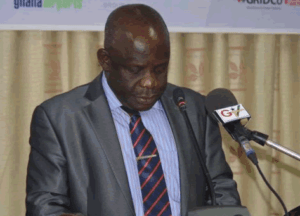Ghana on course to have Nuclear Power Plant

Professor Benjamin J. B. Nyarko, the Director-General of the Ghana Atomic Energy Commission (GAEC), has said Ghana is s on course to owning a Nuclear Power Plant.
“Currently we are about exiting the Phase One, which involves, primarily, the decision making level of the country to pursue a Nuclear Power Programme (NPP),” he said.
Also on course was the consideration of all the 19 infrastructural issues against the International Atomic Energy Agency’s (IAEA) Milestone Approach for the introduction of Nuclear Power, he said.
These, he said, included legal and regulatory frameworks, nuclear safety and security, radioactive waste management, human resource development, stakeholder involvement, and the issues about the capacity of the national grid.
Prof. Nyarko said this when he briefed Mr William Owuraku Aidoo, the Deputy Minister of Energy and Petroleum, and his team during a familiarisation visit to the Commission.
He said the country had already received a pass by the IAEA for meeting all the 19 infrastructural requirements to be considered for the commencement of a Nuclear Power Programme.
He said the next Phases of the NPP would then include the preparation of infrastructure, citing and construction of the Plant and engaging an operator.
The Director-General said the Commission had put in painstaking efforts to ensuring high safety and security among other regulations in its Nuclear Power Programme, and though the journey had been long and challenging, it had also been exiting with the knowledge that Ghana would benefit greatly from the expected enhanced economic growth and national development.
He indicated that nuclear power provides a cheaper alternative to the other sources of energy supply, had a lasting operating time, and could be operated continuously for 18 months non-stop among other benefits.
Prof. Nyarko also spoke about other activities and events of the Commission such as the historic conversion of Ghana’s former Highly Enriched Uranium (HEU) Reactor Core to a Low Enriched Uranium (LEU) Core from 90.2 to 13 per cent, which could currently be used for educational purposes, research and for improving the economic gains of industry and for the country as a whole.
He said the changeover had improved the performance of the Reactor, contrary to public perceptions that it would be reduced and that the previous could generate 30 kilo Watts (kW) of power, but the LEU has improved its generation to 34kW.
He explained that the HEU, which had a lifespan of 10 years, was prolonged to 20 due to its regular maintenance, adding that Ghana has a 24-year experience in operating a nuclear reactor, which had earned her a good reputation among the international community and also the IAEA.
Prof. Nyarko said GAEC operated under seven Institutes and provided a wide range of services to industry, the health and agriculture sectors.
He later led the Minister and his entourage to tour the facilities of the Commission notably among them being the Research Ghana Reactor Centre.
Mr Aidoo commended GEAC for patiently working hard to develop and achieve the right fundamentals for the country’s NPP, and said although capital intensive, the Government would maintain its collaboration and engagements with possible vendors and the financing options available.
He indicated that after interacting and collaborating with GAEC on the NPP, he had gained the understanding that Nuclear energy was not as dangerous as it had been perceived by the public.
Mr Aidoo explained that the processes towards the construction of a Nuclear Power Plant made it very safe and secure and asked the public to have a positive mind about nuclear power.
He pledged the Ministry’s continuous commitment towards the NPP to ensure sustained electricity supply for economic growth and national development.
Source: GNA

What happen to the sun? Ghana cannot even police the police, manage a decent looking airport, enforce road traffic laws how we expect to police and monitor a nuclear plant.